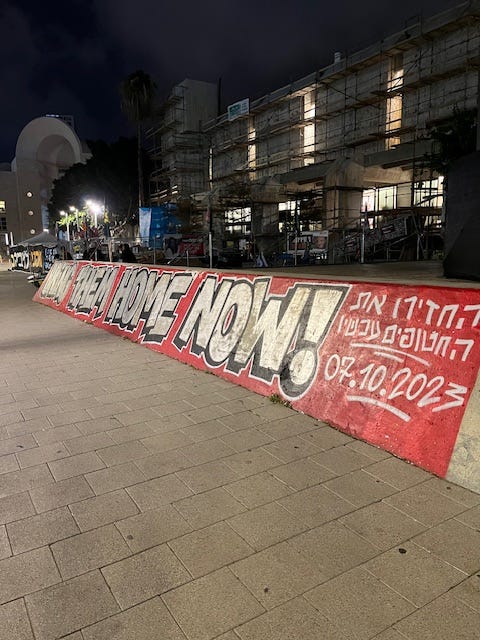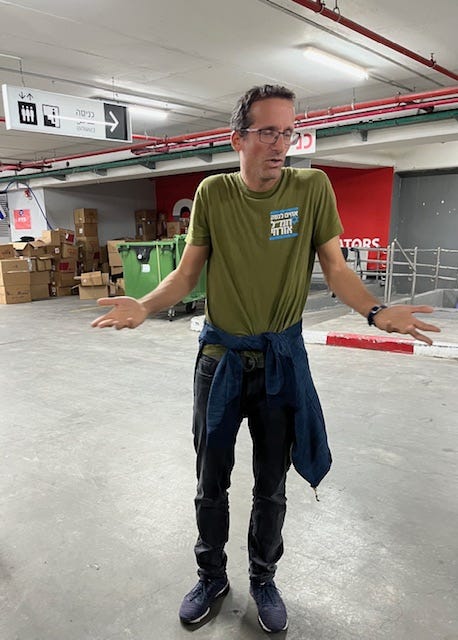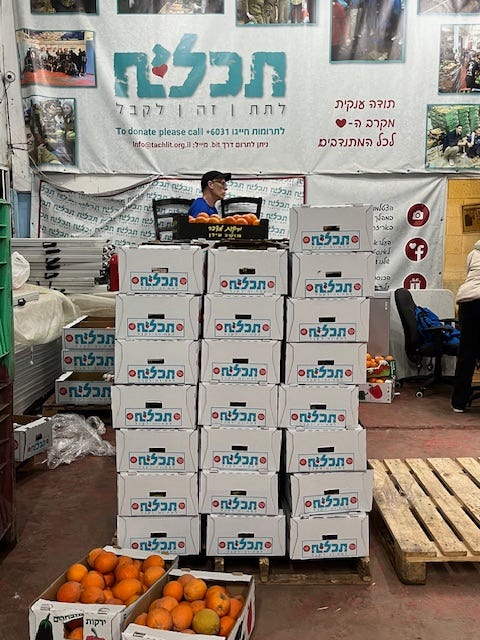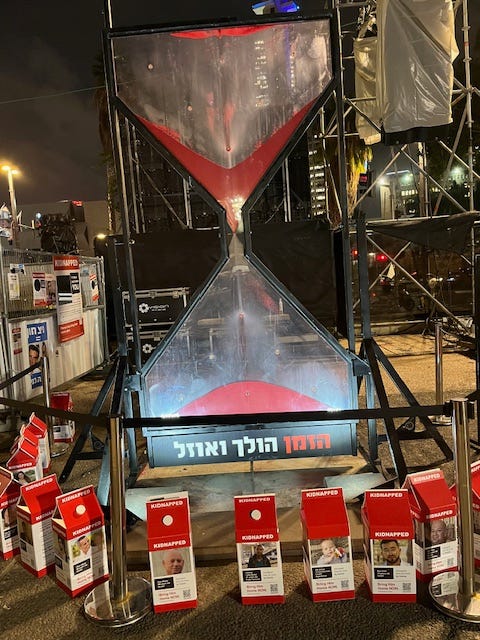Still In Trauma, Israelis Transition From ‘Start-Up’ To Rebuilding
Society has rebounded brilliantly to shock of Hamas attack, but war is taking its toll.
The message is everywhere: This one is at Hostage Square in Tel Aviv.
Jerusalem – “We are a nation of lions, led by asses.”
That colorful quote from a soldier pretty much sums up the sentiment of people I’ve met here over the last two weeks, from political experts to ordinary citizens. It reflects their anger and frustration with the terrible failure of the government, army and security services leading to October 7, as well as pride in the remarkable resilience of a society that rebounded with one heart from the shocking tragedy. Since October 8, countless volunteer projects have been launched and continue to care for the country’s bereaved and displaced citizens and provide meals and gear for their beloved IDF.
One positive outcome from this tragic situation is that many Jews from around the world, and especially the U.S., have taken up the cause and contributed not only financially but by participating in Israeli volunteer efforts and creating their own, providing IDF units everything from thermal underwear and headlamps to pizza and beef jerky, a favorite with the soldiers.
Beyond that, missions to Israel sponsored by American federations, synagogues, communities and various organizations have been continuous for weeks. They often include tours of the stricken kibbutzim in the south, meetings with survivors of the attack, visits to wounded soldiers in the hospitals, and opportunities to help farmers gather crops and/or volunteer in chesed projects for those in need.
My wife and I joined more than a dozen lay leaders on a UJA-Federation of New York mission for an afternoon this week that opened with Ari Shavit, a leading Israeli journalist and author, offering an insightful analysis of the unprecedented challenges Jerusalem faces in a conflict he calls “The Battle for Israel.” He asserted that 2024 will be “the most important year in Israeli history,” a “make or break moment” to rebuild the country. That will require bringing “forces of realism into the political process,” fighting extremism and cynicism, and supporting a vision for Gaza that would offer “an Arab solution.”
A self-defined “passionate centrist,” Shavit said the prospect of Israel controlling Gaza’s population of more than two million people, with many weapons and “angry young men,” would sap Israel of its energy and was a non-starter. He called for a plan being discussed in Washington that would have countries like Saudi Arabia and the United Arab Emirates – with billions of dollars, success in countering radical Islam, and skills in building modern, if not democratic, societies – lead the way in a kind of Marshall Plan for Gaza.
“The real significance of this war is that it is for you as well as for us,” he told his American audience, “and not only for the Jewish people but for protecting the free world” from the global threat of countries like Iran, Russia and China.
Israel needs American Jews to step up and help assure the survival and growth of the state as both democratic and Jewish, Shavit said. “We are family. Don’t be shy.”
Huge Space, Huge Heart
Our next stop was the giant Tel Aviv Expo warehouse, which became the civilian command center of the national all-volunteer effort on October 9, and has never stopped providing seemingly anything and everything needed for soldiers, displaced families and others in need.
Launched by Brothers In Arms, the group of army veterans who organized the huge weekly rallies against judicial reform, changed its name – now Brothers and Sisters for Israel – and its objective, from protest to providing goods and services, almost overnight. With 15,000 volunteers, it has become the largest civic aid organization in the country – the tangible symbol of the flexibility, creativity, empathy and resolve of Israeli society.
Overnight transition: Yonatan Tomkin at the civilian command center.
Yonatan Tomkin, who is a civil engineer, now devotes full time as Expo warehouse manager and logistic manager. He guided us through the enormous underground space, which was a parking lot before the war. Since the Expo effort recently pivoted from emergency responses to long-term projects like education for young children and agricultural initiatives, there are far fewer volunteers needed in the warehouse these days. But we got a sense of the huge scope of the project when we saw in just one area of rows and rows of men’s and women’s clothing, household goods, kitchen equipment, car seats and baby strollers.
Tomkin explained that the volunteers take great pains to make sure the products are in excellent condition. In preparing the used toys, for example, jigsaw puzzles are checked to make sure no pieces are missing, dolls are washed and cleaned, and each item is packaged like new for the “toy store.”
“Many of these items are going to people who are not poor, but are middle-class and have been displaced,” he said, emphasizing the importance of honoring the dignity of each recipient.
Tomkin expressed gratitude for the outpouring of volunteers and donations, many from the diaspora, who made the whole effort possible.
Mark Medin, UJA-Federation’s executive vice president who staffed the mission, told the participants that the charity has provided grants totaling $1,240,000 to Brothers and Sisters for Israel since the war began.
The Fruits Of Our Labor
Everywhere we go here, we are thanked for visiting in this time of need, and there is a palpable sense of am echad, one people, connecting diaspora and Israeli Jews at a time when the gap between them had been growing wider.
One day we spent a few hours in the industrial neighborhood of Givat Shaul, joining about 20 other volunteers, most from America, at a non-profit, Tachlit, packing boxes of fruits and vegetables on a make-shift assembly line. Once we got the hang of it and had a brisk rhythm going, there was a feeling of accomplishment among us as we filled about 130 boxes with lemons, oranges, bananas, cucumbers, potatoes, a small jar of pesto and a sleeve of garlic. (About half of the produce is donated by Leket Israel, the nation’s leading food rescue organization founded by Joseph Gitler, an American oleh from New Jersey.)
Serving the need: Hundreds of volunteers a week assemble and pack fruits and vegetables at Tachlit, a non-profit in Jerusalem.
David Amor, the foreman who gave us our instructions in a no-nonsense style, softened considerably at the end of our shift. He and Aaron Cohen, who established the charity 25 years ago, explained how they strive to match needs and sources in providing 12-pound food boxes for more than 1,500 families a week, a number that has increased dramatically since Oct. 7.
Tachlit also holds prayer services every day on the second floor of the building, and hosts Torah study and the recital of kaddish every night for all the victims resulting from the war.
The two men noted that they have about 400 volunteers helping each week, and thanked us all graciously for our help. “We appreciate the warm heart of American Jews,” Amor said. “We are not asking for charity but for partnership.”
Fissures Starting To Show
There is a new level of humility among Israelis now, a recognition of the complete failure of the government, military and security services leading to the October 7 tragedy. And a greater appreciation of diaspora Jewry sharing their pain as Am Echad, one family, in addition to financial and political support. People here acknowledge they are still in shock, grieving and feeling unsafe almost four months after the barbaric Hamas attack, unsure of even the immediate future. We share with them our prayers and support as their brave sons and daughters do battle and thousands of families from the south and the north live as refugees in their own country. Israelis, in turn, express to us their deep concern about the unprecedented spike in anti-Semitism in America, asking if we feel safe in our own neighborhoods.
American and Israeli Jews are bonding like we never have before, but sadly, the stronger connections are from our new, shared fears and feelings of vulnerability. It took a horrific war to unite Israelis who were teetering on the edge of a civil war this past year, and to bring a higher degree of understanding and appreciation within each of the world’s two largest Jewish communities, one for the other.
How long will Israeli solidarity last? It’s hard to say. Already there are fissures within the society as the war grinds on without any dramatic victory or clarity of what “mission accomplished” could mean.
Within the Orthodox world, there is a growing resentment and anger over the large charedi community’s overall resistance to army service. The Religious Zionists, whose sons combine yeshiva learning and army service, are over-represented in the IDF, and among those who have fallen in the war. But only a very small percentage of exempt charedi young men choose to serve in the army, and some are shunned in their communities for joining.
In recent weeks, an open letter signed by hundreds of Religious Zionist mothers whose sons are in the IDF, called on charedi mothers to urge their sons to fulfill a moral obligation and serve. The letter’s tone is empathetic, not angry, which makes its message all the more poignant.
Written with a “trembling hand and broken heart,” it acknowledges that many charedi women are praying for the soldiers and hostages and have participated in various efforts to support the soldiers, their families and those who have been displaced. But that is not enough, the letter says. It reads, in part:
“We are … aware that you, like the whole of ultra-Orthodox society, attach great importance to Torah study and see in it a supreme value and even assistance in safeguarding the people of Israel. But none of these can replace enlisting in the IDF. This is the Jewish, moral and civil duty of anyone who wishes to live here. The absence of that standard constitutes a distinction between blood and blood. This reality is no longer bearable. …
“It is impossible to live here without an army, and we are all responsible for one another: it cannot be that others will take risks and risk their children for me, when I and my children will not take risks for them. My blood is not redder than theirs.”
Tellingly, the letter says the appeal is aimed at mothers rather than ultra-Orthodox rabbinic leaders because it is futile to change their minds.
Saving Hostages, At What Price?
The most significant challenge to maintaining unity in wartime is over the fate of the hostages. Some, including Prime Minister Netanyahu, insist that the best and only way to rescue them is to press on with the fighting in Gaza. Others, led by some of the families of those kidnapped, have run out of patience and are calling more vocally for prioritizing a cease-fire that would free their loved ones. With it all, there is no information on the condition of the hostages, or whether they are alive, and no clear method of how the IDF could save them.
It’s a heart-breaking dispute, and hovering over it is the unspoken recognition that Hamas is calling the shots here, relying on the inherent humanity of Israeli society – and Hamas’s utter disregard for their own people’s suffering – to burden Jerusalem with an unsolvable problem for this traumatized nation.
It became clear in recent days that the government’s five-man war cabinet is itself divided when former IDF chief of staff Gadi Eisenkot publicly accused Netanyahu of “selling illusions” that the army’s ground war could lead to the rescue of the hostages. Eisenkot, whose son and nephew were killed within days of each other while fighting in Gaza, called for a deal to gain the hostages' release.
Every Israeli wants the hostages home. But some people feel that the greater the campaign to “bring them home” – a more effective slogan would be “let them go,” putting the onus where it belongs, on Hamas – the more precious the hostages are to Hamas, redoubling their efforts to keep them.
In private conversations, some here say that however thrilling emotionally it would be to make a deal and have the hostages freed, the conclusion among Israel’s enemies would be that kidnappings are the Jewish state’s Achilles Heel, and they would double their efforts to capture soldiers and civilians. So, they say, making a deal for these 136 suffering souls could well lead to the suffering of countless more in the future.
There is unavoidable logic to that argument, but a visit to Hostage Square in the center of Tel Aviv offers a powerful confrontation with the anguish and suffering of the families in limbo that breaks your heart.
Sign of urgency: Hourglass at Hostage Square stresses time is of the essence.
There is a large tent and smaller ones where relatives sit in a circle and are joined by friends and visitors. Some sit quietly, some offer words of comfort, and there often is singing. The distinct feeling is of a shiva home, but one realizes these family members do not have the solace of boundaries offered by seven days of mourning. Their grief is ongoing, mixed with the constant anxiety of the unknown, and the fear that they may never know the fate of their loved ones.
There is the now iconic, endlessly long table with settings for those who are missing; a make-shift canvas tunnel to give the feeling of the darkness the hostages endure; and various forms of art to convey the plight of those kidnapped, including a large hourglass reminding us of the urgency at hand.
People come and go, quietly exploring the large physical area as well as encountering the small space inside you that offers a new definition of despair.
The Power Of Laughter
With it all, Israelis do their best to go on with their daily lives, which includes laughter. So it seemed only fitting after visiting Hostage Square for us to attend in Jerusalem a sold-out performance of Comedy For Koby, featuring four American stand-up veterans: Avi Liberman, Brian Kiley, Butch Bradley and Peter Berman.
It was the last of their six performances around the country, sponsored by the Koby Mandell Foundation, named for the 13-year-old American-Israeli boy who, along with a friend, was brutally murdered by Arab terrorists in the spring of 2001 near his home in Tekoa.
The foundation is the largest provider of support services for bereaved parents, widows, siblings and orphans whose loved ones were the victims of Arab terror. It has held therapy sessions for widows of soldiers killed in Gaza, and is planning a spring program for children who have lost a parent or parents, in addition to its many ongoing retreats and therapeutic programs.
The comics were in fine form and kept the audience in high spirits throughout. Most memorable, though, were the post-performance comments on stage of Butch Bradley, a veteran of these shows, and Peter Berman, who had not been in Israel before. They each expressed their admiration, love and support for the people of Israel, which meant so much to the audience.
Koby’s parents, Rabbi Seth and Sherri Mandell, who transformed their personal grief into helping others, believe that laughter can be a way to defeat those who want us to suffer.
“This show is important,” Sherri said, “because even in very difficult times, we need to know that sadness and happiness are sisters – they’re not opposites. And by laughing, we keep up the morale of the home front.”








